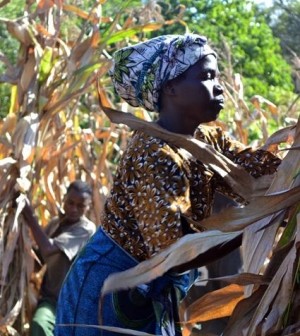- Mothering in a Fractured TimePosted 15 hours ago
- Beneath the Surface: Revealing Life’s Goals nurtured from a Spiritual SeedPosted 4 days ago
- How We Kept Marital Peace while Traveling the World with Our KidsPosted 2 weeks ago
- How I Coped with Feeling Lost in a Changing SocietyPosted 2 weeks ago
- The Unexpected Liberation of a Butt DialPosted 1 month ago
- Why is France making abortion a constitutional right?Posted 2 months ago
focusing on women to break the cycle of hunger in Malawi

by Sarah Rawson of The World Food Program.
(edited)
The World Food Program is working to break the cycle of hunger in Malawi.
Women play an essential role in ending the cycle of hunger and poverty. Worldwide evidence shows that when women are disadvantaged so are their entire communities. Increasing women’s control over financial and physical assets:
– raises agricultural productivity
– improves child health and nutrition
– increases household spending on education
– contributes to better food security and poverty reduction
(World Bank 2003; Quisumbing 2003).
In Malawi, women are generally disadvantaged in all spheres. For example, 83 percent of female-headed households are asset poor (EFSA 2013). When looking at issues of food security, women generally eat less and use negative coping strategies more often than men. And, even when women are able to produce surplus crops, they find it more difficult to join and become active members of farmer organisations that could connect them to markets and increase their incomes. It is because of such factors that WFP makes sure to give special attention to gender in all its programmes in Malawi.
Social protection through school meals
As part of the strategy to empower women, WFP supports the Government in providing social safety nets to vulnerable groups. For example, WFP’s School Meals Programme is an integral part of the social protection system in Malawi.
The social protection benefits of schools meals are most evident during the hunger season, when poor families face tough choices on whether to send their children to school, or to seek employment or, as is often the case for young girls, to be married off. The promise of a daily meal at school can persuade parents to send their children to school and keep them there until they’ve finished their education.
School meals have the greatest impact on improving attendance and overall performance among girls as they tend to be more likely to drop out than boys.
When girls stay in school and finish their education, WFP knows that there will be generational benefits to the entire community since an education better equips mothers to ensure their children are well-fed and properly nourished.
Farmers’ cooperatives
Through its Purchase for Progress (P4P) initiative in Malawi, WFP works to achieve equal representation of men and women in farming cooperatives. P4P is a pilot initiative through which WFP and its partners help smallholders develop harvesting and business skills so that they can become competitive players in the marketplace, thus boosting their incomes and improving their lives.
WFP prioritises the inclusion of women in P4P cooperatives and ensures that needs specific to women are adequately addressed in skills trainings. Currently, out of the more than 16,000 farmers who participate in P4P, nearly 7,000 are women. More significantly, women hold more than 42 percent of leadership positions within cooperatives. Women’s increased leadership role is indicative of significant progress as it means that women become empowered to make their own business decisions and influence others as well.
Feature Image copyright wfp.org.



